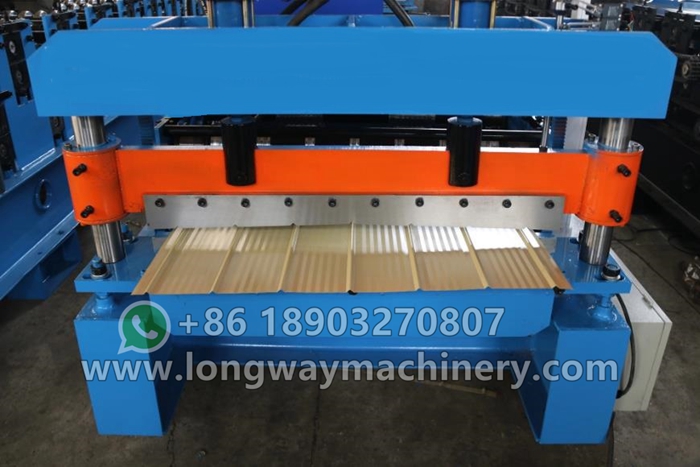Steel Stud Roll Forming Machine for Efficient Construction Project Solutions
The Steel Stud Roll Forming Machine Revolutionizing Construction
In the ever-evolving world of construction, efficiency and precision are paramount. With the demand for lightweight, sturdy, and cost-effective building materials increasing, steel stud roll forming machines have emerged as a game-changer in the industry. These machines streamline the production of steel studs—essential components widely used in modern construction for framing and support structures.
Understanding Steel Studs
Steel studs are a more durable and fire-resistant alternative to traditional wood framing. They are primarily made from galvanized steel, ensuring they resist corrosion and have a longer lifespan. In the construction of commercial buildings, homes, and various structures, steel studs provide substantial structural integrity while also being lighter than their wooden counterparts. This combination of strength and lightness aids in reducing building costs and supports quicker, safer construction processes.
The Role of Roll Forming Machines
A steel stud roll forming machine is a specialized piece of equipment designed to manufacture steel studs efficiently. The machine works through a continuous bending process, where sheets or coils of steel are fed through a series of rollers. These rollers shape the steel into the desired cross-sectional profile, creating studs in varying sizes and configurations. The process allows for rapid production rates, with machines capable of producing hundreds of studs per hour, thus significantly decreasing lead times compared to traditional methods.
Key Advantages of Steel Stud Roll Forming Machines
1. Cost Efficiency One of the most notable advantages of using a roll forming machine is the reduction in manufacturing costs. By automating the production process, labor costs are minimized, and material waste is significantly reduced. The ability to produce steel studs on-demand means manufacturers can better control inventory and reduce storage costs.
2. Consistency and Precision Roll forming machines ensure that every steel stud produced is uniform in size and shape. This consistency is crucial in construction, where precision can mean the difference between a successful build or costly revisions. Additionally, the standardized production process reduces the risk of human error.
steel stud roll forming machine

3. Customization Modern roll forming machines can be designed to produce a variety of stud profiles with ease. This flexibility enables manufacturers to meet specific project requirements or adapt to changing market needs without significant investments in new machinery. Customization allows for the production of not only standard studs but also unique shapes that may be required for specialized construction projects.
4. Eco-Friendly Production The use of steel in construction is inherently more sustainable than traditional wood. Steel can be recycled repeatedly without degrading its quality, and advancements in roll forming technology have allowed for the use of thinner materials that still meet structural requirements. This reduction in material consumption associates the manufacturing process with a smaller carbon footprint.
5. Faster Turnaround The speed at which steel stud roll forming machines operate leads to faster turnaround times for construction projects. Quicker production means projects can move forward more rapidly, allowing builders to meet tight deadlines and respond to market demands effectively.
Future of the Construction Industry
As construction practices continue to evolve, steel stud roll forming machines will likely play an increasingly vital role. Given the escalating focus on sustainable building practices, the advantages of steel studs—as enabled by these advanced machines—position them as a preferred choice for contractors and builders alike. The integration of smart technology into roll forming machines, such as automation and real-time monitoring systems, promises even greater efficiencies in the future.
Moreover, the global push for energy-efficient and environmentally friendly constructions aligns perfectly with the capabilities offered by steel studs. As architects and builders seek innovative solutions to meet these needs, the reliance on roll forming technology is undoubtedly set to grow.
Conclusion
In summary, the steel stud roll forming machine represents a significant advancement in manufacturing technology within the construction sector. By promoting cost-efficiency, precision, customization, sustainability, and speed, these machines are not only enhancing productivity but also shaping the future of construction. As we move towards a more efficient and eco-friendly industry, the role of steel stud roll forming machines will undoubtedly become more critical, paving the way for innovative building solutions.
-
Roof Panel Machines: Buying Guide, Types, and PricingNewsJul.04, 2025
-
Purlin Machines: Types, Features, and Pricing GuideNewsJul.04, 2025
-
Metal Embossing Machines: Types, Applications, and Buying GuideNewsJul.04, 2025
-
Gutter Machines: Features, Types, and Cost BreakdownNewsJul.04, 2025
-
Cut to Length Line: Overview, Equipment, and Buying GuideNewsJul.04, 2025
-
Auto Stacker: Features, Applications, and Cost BreakdownNewsJul.04, 2025
-
Top Drywall Profile Machine Models for SaleNewsJun.05, 2025








